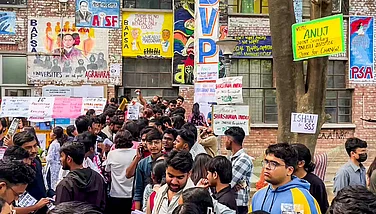As one of India’s foremost B-Schools, XLRI is considered a ‘rich’ institute. What does it entail to manage the finances of such an institute?
The first thing to remember is that XLRI is purely self-financed. If we look back at the early years, for almost four decades, XLRI struggled financially. The support of the Jamshedpur Jesuit Province kept the institute running and growing. It is the Jamshedpur Jesuit Province who have put up all this infrastructure on campus from scratch on land leased to us by Tata Steel.
There were times when the then Directors would have to send out letters to leading businessmen in the township to help pay salaries. It was only in the new century when we started doing the satellite programmes, the institute started seeing some income. These were the first revenue-generating programmes we started, and since then by the grace of God, the immense hard work by faculty members, and of course, alumni support we have not suffered from such financial crisis.
Faculty members have worked extremely hard to bring in more Management Development Programmes, consultancies in companies, and several short-term certificate programmes. Thus, the institute gathered the resources to stabilise and grow. It is through the student fees we achieved the academic infrastructure needed.
Collectively, this revenue was used to establish the new campus, building the International Centre, the Learning Centre and so on. It is this that enabled us to go beyond our campus to Delhi - NCR, then Mumbai, then Amaravati. Further plans will now be executed from our own resources.
We see so many Centres of Excellence, the endowments and the Chairs. How are these funded?
Yes, one major success is that we have allocated funds for specific causes. Such as the JRD Tata Foundation for Business Ethics, JRD Tata Chair, Fr McGrath Education Fund, then HRD Centre Fund, several endowment funds, scholarship funds, medal funds, alumni funds, XLRI Education Development Fund; Environment & Sustainability Fund and Infrastructure Development Fund.
These funds have been created to secure the institute from financial crisis – so that our work under these aspects continues. These funds were generated from the surplus, allocations and alumni contributions primarily. As a policy, a part of the surplus is allocated to the specific funds every year to ensure that the services we render through various centres and committees do not suffer.
You mentioned committees - how are student activities financed?
Committee activities are funded by the institute but the major events are all through sponsorships that the students raise themselves. Every year, students raise significant amounts through sponsorships. This is real-life training for them – they exercise their talent, leadership, organizational skills, negotiation skills, fundraising skills. It is really amazing to see how students go about organizing large scale events on and off campus. They do a fantastic job in managing their committees.
Can you tell us about the social engagement activities at the institute?
Other than students’ direct involvement with the lesser privileged section of the society through regular activities such as organizing literacy programmes, awareness drives, blood donations, distribution of care packages, XLRI utilizes its funds, about two crores a year for the promotion of primary education in rural areas in terms of giving back to society.
XLRI in 1949 began by offering short-term courses in management and trade unions. In our Platinum Jubilee year, XLRI’s Skill Development Cell (SDC) is aiming at reliving the original dream of the founding fathers. To fulfil this mission, we are committed to train youth from the rural areas of Jharkhand and Odisha, with employment skills. SDC aims to bring in the SC/ST/OBC youth together to explore their potential and learn skills that will make them independent. Those fulfilling the eligibility criteria will be shortlisted and trained with financial support from XLRI.
In our first year, we received about 90 applications. Considering the feasibility and effectiveness, the first batch of 32 students was selected for Computer Data Entry Skills and Communicative English. On October 16, the first batch commenced their programme at Human Life Centre, Bhubaneswar. Today, 17 students are doing the Sewing Machine Operator’s course at Chaibasa, 7 candidates will be trained in electrical wiring, Motor Mechanics and A.C repair & Maintenance respectively in Jamshedpur. About 55-60 youth will be helped by the SD Cell in this financial year. Efforts are on to find funding for SD Programmes to scale up the number of beneficiaries.
I am coordinating this initiative with the help of my colleagues, James Tirkey and Caroline Daniels.
From finance to administration. In terms of governance, how does XLRI adhere to the requirements of the future?
At the heart of all our planning for the future are issues of sustainability, of collaboration, of giving back to the community.
As the first B-School to teach sustainability as a core subject, we are conscious of our own obligations. Our sustainability practices and initiatives include that of keeping our campuses sustainable. Our Delhi building is a state-of-the-art green structure. Jamshedpur poses other challenges as the buildings are much older. We work with solar power. Every day, we strive to grow our compliance with not just the requirements mandated by government but the just requirements of the future.
The second aspect is working on sustainability projects. We have already started work with the Tata Group. The next goal is to enter the government-level initiatives and programmes.
With Environmental Social and Governance (ESG) standards already being mandated, ESG quotients will become prerequisites for funding, projects, collaborations. We plan to set up a dedicated Centre for Sustainability, start offering programmes, with the eventual aim of offering a full time, two-year programme. And if we are offering programmes, it is but understood that our compliances are also in place.
What other administrative practices and cultural factors foster the excellence that XLRI is known for?
I would say a higher degree of pastoral care - the involvement of professors and staff with students beyond the classroom. Students and young people today in general, exist in a high-pressure and highly complex environment. The burden of paying back their student loans, intense competition and of course their personal challenges. Today it is important for professors and even staff members to be available to them outside of class hours and play a vital role in mentoring and counselling.
XLRI started as a 60-student institute – the students, faculty members used to play together, attend parties together. Today the numbers make this impossible but it has evolved to suit present-day realities. One may say that this places an additional burden on the faculty members. But, you see, my colleagues are deeply invested in the success of their students, the institute and they understand the importance of pastoral care.
If you compare with other B- Schools, the interaction between faculty and students is at a much higher level. We cultivate a culture of care. Students know who to reach out to, they have help available. Of course, certain things are mandated but many more things are simply part of our culture here.
The core value at XLRI remains family – and it is through these interactions outside of class hours that we build the core strengths in our students that XLRI is known for.
Any endnotes, Father?
Just that we are marshalling and managing all our resources in order to grow from strength to strength. And to go back to your first question, XLRI has always been rich in its culture, its spirit of excellence and its spirit of service. Every member of the XLRI community is committed to ensuring that the XLRI legacy continues unabated. I am happy with the talented, energetic, enthusiastic and passionate students, faculty and staff. This is our strength and we draw our energy from each other to move forward.





















